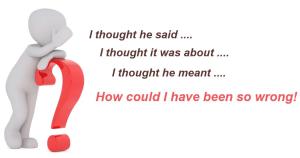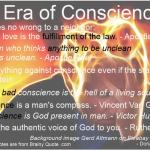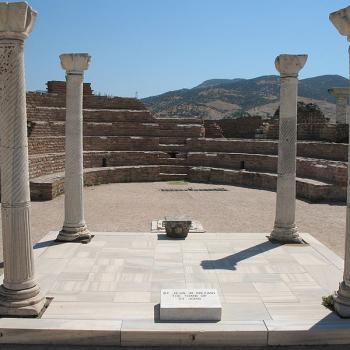None of us are smart enough to challenge God. We don’t even know what God is. Nearly every religion believes in a “Creator God,” the God above all and everything. Yet many people think they are the only ones in God’s Kingdom. While I practice Christianity, I understand it doesn’t exclude other people, and Jesus himself indicated as much.

Image composition: Dorian Scott Cole. Figure image: Public Domain, not credited.
One of my favorite and frequent statements to my wife is, “I know nothing. How could I have been so wrong!” She usually agrees.
Our vision is extremely limited
Not many of us have the tools to look back 3500 years or more to interpret what is written about that time and all time forward. Judaism started to be written down in around 1200 BCE.
The recorded religion of ancient Sumer is much older, dating to around 3000 BCE. Abraham came from this area much later. In the land that was to become Israel and Judea, Abraham consulted the Priest of the Most High God, Melchizedek. God wasn’t founded by Judaism.
Religion didn’t begin with Moses. The Hebrew religion was begun by Moses, and at that time there were many other religions in the area. Their influence can be seen on Moses the law giver, who rejected things in them to set apart the religion he founded.
Both Judaism and Christianity understand themselves to be examples to others, primarily of love. Unfortunately they sometimes see themselves as some exclusive cult. Forgiveness removes the barrier of having harmed others and turned from God. We’re all God’s children and none more deserving than others.
Unbound
I’m not bound by any denominational doctrine, and certainly not by any political leanings. I try my best to remain unbiased. Jesus talked about truth and being set free. From my many years of study, I believe what he meant by that is that we aren’t bound by religious systems and not to be stifled by wrongdoing, but we are judged ultimately by our behavior. And we’re forgiven for our behavior if we ask and earnestly want to do better. If not we are our own worst judge and suffer mightily.
What I see in other religions is that God is manifest (demonstrated) through select figures. Even in the Hindu religions various figures represent various aspects of the One God. The many gods aren’t much different from Catholic Saints, although many would differ in that opinion.
Educated
I’m not an academic theologian or devoted to a single denomination, which sets me apart from a huge number of people who study the nature of God and what God asks of us. I’ve been a member of many denominations. I have to be well educated and even today take courses from Harvard, MIT, and many other universities. I appreciate academic scholars for their inquiry and constant presentation of new ways of looking at things. Also for their ability to understand ancient languages. I studied two languages, so I appreciate the difficulties in translating. These things are very important.
It takes a well-rounded education to see things without bias. It helps to have a good education in the humanities and sciences. Anthropology, psychology, sociology, semiotics, religious studies, narrative structure (as seen in English studies, novels, movies), history, communications, meaning …. I also have a background in engineering and have done a lot of design work for companies in electronics, electrical, and mechanical, including having designed and built two large homes. I’ve also written a lot of fiction and made comedy movies.
I’m kind of a renaissance man. I don’t live in an ivory tower among elites, I’m a very real person who lives in a very real world. To most people I say, “I’m just Dorian.” I expect no more respect than is due everyone.
I grew up on a farm doing everything the hard way. This is an education in itself. I learned how to be self-sufficient, industrious, and to be adaptive and creative. You have to fix things that break and care for things and animals continuously without fail.
In the Navy I learned electronics, Vietnam era. Later I worked in electrical generation and distribution where you don’t make mistakes ever, and then in the medical field off and on for over 23 years in research and clinical, often in private conferences with physicians.
Religious growth and faith
I approach everything from a position of faith. I left my Methodist heritage and became a seeker. Then came back to Christianity. My religious duties, after college, were as teacher for adults age 18 to 29, associate pastor, counselor (frontline, not clinical), pastor (licensed, major denomination that I no longer serve), church outreach and growth with several denominations, and then writer of several books and the OneSpiritResources Website.
My primary areas of understanding and work are pastoral ministry, communications, attitude and attitude change, psychology, sociology, religion, and semiotics. I developed original theories in visual semiotics.
I understand how communication works with attitude – they are very intertwined both to learn new words, ideas, and experiences, and to interpret conversation. I primarily studied attitude change in psychology in college and frequently have successfully worked with it. Most of my work experience has involved communicating, and has often included course design.
Wisdom is the soundness of an action or decision with regard to the application of experience, knowledge, and good judgment. Part of gaining wisdom is experience – often painfully. Wisdom is experiential. Drawing from the Simon and Garfunkel song Kodachrome, you can’t see straight if you’re blinded by all the crap you learned in high school.
People get this confused a lot. Knowledge isn’t wisdom. Knowledge is something that has to be tested to see if it’s correct. Yet without a good foundation of knowledge you have nothing to judge. Experience is the test and leads to wisdom.
Theology
Theological leanings
Fundamentally I think that the nature of God is demonstrated in what God asks of people. God is love. Beyond that we have no understanding. God sent people (manifestations, incarnations, guides) to show us the way to live and to have abundant life.
God offers forgiveness for those who ask and want to do better. God views all people the same and makes the sun and rain fall on everyone. “All” is a big word. God doesn’t play favorites.
God is spiritual and those who live in God’s ways live in a spiritual world. The spiritual world encompasses many things, not the least of which is a lot of ideas. Some ideas are good, some bad. Through experience we know to avoid some ideas, and through experience we prove or disprove others. The Bible, the library, the Internet, college, life – all are spiritual places where we learn.
God’s ways are about how we treat others. Following God comes first, but inevitably he turns our attention to how we treat others – love. Those who follow Gods’ ways have better relationships which leads to better opportunities, so they have better lives. “Blessings” are about happiness, not about God giving you things.
Writing
I’ve been writing about religion since the early 1980s. Over the years I’ve written many books on religion and spirituality. These books aren’t “off the cuff” thoughts on spiritual things. Each book represents years of intense study. These books include:
The nature of God (Appease the Volcano). This book covers the development of many religions up through the time of Jesus. It looks at the development of law, mercy, forgiveness, and love over time.
The nature of prophecy (The Prophetic Pattern: Ancient and Modern Prophecy),
Spiritual Growth. My latest book is New Generations walk With Jesus. New Generations Walk with Jesus helps clear away the nonsense that is causing most of Generation Z to completely reject Christianity and religion.
In the realm of theology I work with several things with confusing names:
Hermeneutics
“Hermeneutics is the theory and methodology of interpretation, especially the interpretation of biblical texts, wisdom literature, and philosophical texts. Hermeneutics is more than interpretative principles or methods used when immediate comprehension fails and includes the art of understanding and communication.
Modern hermeneutics includes both verbal and non-verbal communication as well as semiotics, presuppositions, and pre-understandings. Hermeneutics has been broadly applied in the humanities, especially in law, history and theology.” Hermeneutics on Wikipedia
Epistemology
Epistemology is the philosophical study of the nature, origin, and limits of human knowledge. It’s especially with regard to its methods, validity, and scope. Epistemology is the investigation of what distinguishes justified belief from opinion.
Eschatology
Eschatology in Christian theology deals with “last things.” Except that most of Christian prophecy doesn’t deal with last things, which confuses people into thinking the end is near.
Prophecy can be about revealing things that are hidden, and is often put written in code, that is buzzwords that were known to Jews but not to others. Most of the time prophecy is about a vision of better times and retribution on Israel’s enemies.
Prophecy often calls people to change their ways and be good people again. It’s almost always about then current times.
In Jesus time prophecy was about the end of the current order of things that happened over the next 300 years, which was a time of horrible persecution for both Jews and Christians and the destruction (end) of the nation of Israel and Judah and their Temple. It didn’t end Judaism as a belief, but Christianity and Judaism are very different. Jesus demonstrated a definitive way to access the Kingdom of God through forgiveness and following the ways Jesus showed us. People in Jesus’ time called this “The Way.” I often use the same term to distinguish my beliefs from the endless iterations of Christianity.
When people asked Jesus about the end of all things, he said no one knows when that will be. He said a perverse and adulterous generation looks for signs. By adulterous he meant people who turned from God to pursue their idols (judging others is a common idol and favorite pursuit), and ceased to do as God asks.
Dispensational
God doesn’t change – he is love. But the agreements he made with the Jews changed over time. That’s scriptural. Through Jesus God made a different agreement with the world: love.
Feminist and liberation theology
I don’t try to speak for women or minorities – they speak for themselves – but I’ll stand up and be counted if they are oppressed or not given opportunities. The Apostle Paul said that we are all the same in God’s eyes. Cultures, especially patriarchal cultures, elevate men and give them privilege, while giving a limited role to women and others deemed less worthy or suitable such as slaves and those of other religions. Jesus was surprised at the faith of those who weren’t Jews.
Jesus broke many Jewish traditions on many occasions by going to women and others who were viewed with disdain or rejected. Women in his era were often in the Jewish Synagogues, and the Apostle Paul even called one of the women who served with the churches an apostle.
It’s 2000 years way past time for male privilege and the patriarchal system to end. These are cultural, not religious.
Fool’s errand theology
Trying to determine the authenticity of texts that are 2000 to 3500 years old by using the standard tools of today’s world, texts which first came from oral traditions in a region, and later from accounts of apostles and other writers, is a fool’s errand. It can’t be done. Today’s tools neither prove nor disprove anything about ancient texts.
The question to ask ourselves is, “What were the ancients trying to tell us, and is it still applicable today given the standard we are to use: love?”
My philosophy of interpretation
I have studied the nature of God for over 50 years and tried to determine Biblical truth through study and experiencing religion. Some call this theology. My method is to seek the truth and do no harm – don’t mislead people – let people have the information and make up their own minds. As a former pastor and communicator, I know this works best.
I dig around a lot in ancient culture, writings, and scripture. But the basic question I try to answer is, “What are they trying to tell us, and is it applicable today.”
Second, you must have an interpretive framework. From endless study of many ancient religions I understand that God is love. That’s the lens through which we must see all things in the spiritual and carnal world. We don’t have a choice – love is the lens.
The development of ancient religions followed a similar path: First there was law to set a minimum standard for human conduct. Then there was mercy and forgiveness from God. And first and last there was love from God, then the requirement that we love others.
Jesus said
What Jesus said was almost entirely to the Jews about Judaism. He tried to help them clarify their religion by helping them understand that following the law would get them into the Kingdom of God about as easily as getting through the eye of a needle. Godliness is about love.
Jesus’ words are good stuff. They help us understand, but we aren’t Jews and subject to Jewish Law no matter how much we try to be. In fact, as the Apostle Paul tells us, following the law only makes us subject to judgement and makes Jesus’ death for nothing. Jesus sent his apostles to teach others how to live in love.
What was intended to continue?
Third, I have to separate ideas that were meant to continue, and ideas that were only meant for a time. The Ten Commandments hail from Noahide Law, and are also natural law. But the Law and Prophets in Judaism were until John the Baptist. Some want them to continue, but very selectively. And some have done the same as the Jews and taken the words of Jesus and turned them into laws to live by. Perhaps some people need that because love is complicated.
I don’t find the words of Jesus to be very comprehensive – he mostly wanted us to live by love, not law. Whether or not Jesus mentioned something is almost irrelevant – love covers it all. Or as Jesus said, love fulfills the law and the prophets – that’s over and we now live by love.
Nor do I find the laws of the ancients to be very applicable to current circumstances. I think they can detract from learning to live by love if it’s done for too long. But their wisdom – that is understanding what they were trying to tell us – can be very helpful. Law can be foundational, and the law (natural law) is within each of us.
We need to understand the purpose of law and from where it came. While Jesus explained that laws like the Sabbath are for people, not God, he also explained that Moses (who gave law) allowed divorce not because it’s a good thing, but because of the hardness of people’s hearts. We need to understand that laws aren’t rigid, but can be helpful guides, and see if they relate to today’s world.
Generally when you put God first, God tells you how to treat other people. That’s what it’s all about. God doesn’t have needs.
Who is speaking?
Fourth, I have to look at who is speaking. Judaism has always had sects, and today those are similar to sects in Christianity. Fundamentalists and some Baptists take a more literal view of the Bible, and Jews have similar sects. I was once a member of these groups and understand them.
Mainstream Christianity and Rabbinic Judaism tend to be more progressive in applying their religion to today’s world. I’m pretty certain that in today’s world we’re not nomads living in tents in the desert as in Abraham’s and Moses’ time. There was wisdom that came from those people, but since that time covenants with God have changed multiple times. Christians have a new covenant with God, and that is love.
It’s impossible to speak in absolutes when various Jewish and Christian groups interpret their literature one way, citing just cause, and others interpret it another way, citing their just cause.
Ancient language is difficult to understand
Fifth, I know enough from studying ancient languages to know that understanding what was meant in 1500 BCE and at the time of Jesus is very difficult. I have to depend on scholars who work with that material. For example, from 300 BCE to 300 CE, ancient Greek went through a lot of changes and they varied by region. koine Greek was a regional adaptation that began in the Middle East beginning with Alexander the Great who took it there and enforced using it. Many learned Jews began writing their religious literature in Greek. And the Romans didn’t speak Greek, they spoke Latin. Jesus likely spoke Aramaic, but he and the apostles likely had a working knowledge of Greek because it was common in the area and used in trade.
When you look at different versions of the Bible from shortly after Jesus, in the Hebrew Torah you see thousands of variations in language that differ from the Samaritan Bible, the Rabbinic Torah, and the Dead Sea Scroll versions.
Christian Bible manuscripts
In the Christian codex (Bible) you see differences in wording from various ancient pieces of manuscripts, the proliferation of Bible translations today, and in regional translations of the time such as the Diatessaron and Peshitta which seem less likely to have been altered since they were independent of established religion.
Is it useful or in the way?
Sixth, I also have to consider, “Is it useful?” I’ve grappled with a lot of difficult situations in my life and made a lot of very difficult decisions. Never have I found it useful to ask what God is trying to teach me or that the enemy is attacking me. What difference does it make – the situation is still the same and I still have to find the best way to react to it. How do I make it better for everyone? Thinking outside of that is just superfluous, distracting, and adds emotion. Who knows what God is up to? If there’s a lesson, I will likely learn it.
Seventh, context. There are several types of context that Biblical literature has to be seen in. I think most people hope that translators have covered that, but the fact is they have their biases and traditions.
Culture is one context. The Apostle Paul went on and on about women covering their hair, but this was a cultural issue. The culture of the Middle East at the time of Jesus was radically different and unnecessary today. And Patriarchal cultures are also very different.
Today we no longer have several wives and inherit brother’s wives on death. We appreciate female children as equal heirs with the potential to do anything men can do, and we don’t have the fears and inhibitions of people living as nomads in the desert. Dietary restrictions aren’t necessary from a health point of view.
Word usage is a major context issue. Like today the meaning of words were added to or changed over time. There were no words or concepts to express some ideas or situations throughout the region.
Cause is another context. What I do focus on is understanding what the cause is. Maybe I can do something to avoid trouble in the future if I understand the cause. People are usually the cause and they are very complex. Most people don’t think rationally – they react from a more emotional-experiential place, so that’s where most problems in life come from.
Life is imperfect. We may have perfection as an ideal and strive for perfection, but life is always less than perfect. Love is an ideal, but it doesn’t heal all relationships or make the world perfect. If you want perfection, choose math – it’s much closer.
Age is another type of context. We see different meaning in passages when we read them later.
There are many other types of context that apply to ancient literature.
Conclusion
This interpretive framework is why I ask people to judge using the very high standard of love, which isn’t something we have a choice about, and to evaluate by using the legal standards of beyond a reasonable doubt and more likely than not.
Next: back to the series on working with new generations: This era of conscience and reformation.
___________________
Our answer is God. God’s answer is us. Together we make the world better.
– Dorian













